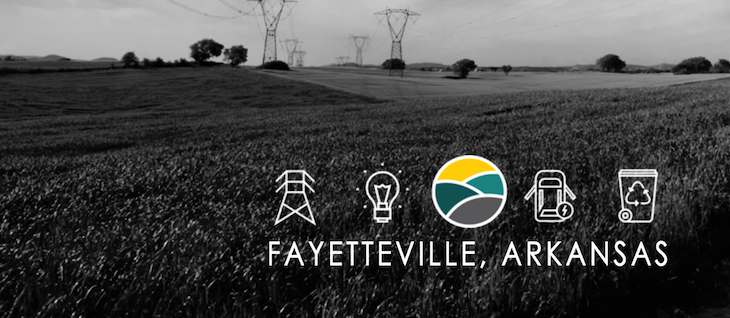Fayetteville approves energy action plan, work starts on short-term action items
by January 4, 2018 2:05 pm 545 views

Fayetteville City Council approved establishing an energy action plan on Jan. 2 after city staff worked with community and city leaders and stakeholders to develop the plan over the past year. The plan came before the city council again after it was tabled Dec. 19.
Peter Nierengarten, sustainability director for Fayetteville, said no changes were made to the plan since it was previously presented to the city council.
“Of course, the plan underwent substantial revision as it went through review processes with staff, administration and stakeholder groups.”
The plan will be a framework for the city to be a resource- and energy-efficient community. Items in the plan include offering incentives and encouraging energy-efficient homes and businesses, striving for energy independence, promoting innovation and an understanding of climate change and improving air, water and soil quality.
Now that the plan is approved, the city will start to implement its short-term action items, including “the advent of a new energy dashboard, which will make city operations and energy expenditures more transparent to the public,” Nierengarten said. “City staff will focus on improving resource efficient purchasing, develop a green fleet policy and improve energy efficiency in a number of city facilities. Across the community, projects will be underway to promote clean energy, advance equity through energy efficiency programs and connect residents with existing opportunities to save money, reduce waste and build a resilient city.”
The overarching goal in the plan is a 40% reduction in greenhouse gas emissions (GHG) by 2030 and an 80% reduction in GHG emissions by 2050, from 2010 levels. Other goals in the plan include the city government to operate entirely on clean energy, 50% of the community to operate on clean energy, to reduce the per capita vehicle miles travel to 2010 levels and achieve a 40% tree canopy cover by 2030. By 2050, the entire community would operate on clean energy.
CLEAN ENERGY USE
Clean energy supplies 21% of the city government’s electricity. Sources include the Southwest Power Pool South electric grid, solar arrays on city buildings, and the Ozarks Electric solar array. Nierengarten said 6 billion kilowatt-hours of clean energy will be added to the grid as a result of the Wind Catcher project, allowing the city to improve to 43% clean energy by 2021.
Fayetteville operates on 14.6% clean energy, according to the most recent eGRID tables of the U.S. Environmental Protection Agency, and the Wind Catcher project is expected to positively impact the community-wide clean energy percentage, Nierengarten said.
“Ozarks Electric also serves Fayetteville and offers our residents the opportunity to participate in a community-solar facility located in Springdale.”
One of the biggest challenges to reaching the goals in the plan “could be inaccurate perceptions that this plan will put undue burdens on residents, developers or businesses,” he said. “The city has already worked diligently to make sure the plan aligns with community-wide goals and strategies; we will continue to conduct outreach and education to ensure that residents’ input is heard and incorporated into future plan-related actions. Another hurdle could be the difficulty of maintaining internal and community-wide momentum as other items come to the table.”
“The belief of the city of Fayetteville is that the goals of this plan are highly achievable. Global market trends, our extremely innovative local economy, a robust local (culture) supporting both environmental and economic sustainability — all are important contributors to the feasibility of this plan.”
‘WE ARE STILL IN’
In June 2017, Mayor Lioneld Jordan signed the We Are Still In pledge, committing to reducing GHG emissions and in line with the goals of the Paris Climate Agreement after President Donald Trump vowed to withdraw from the agreement. The United States is the only country that has rejected the global pact. The pledge goals, which are aligned with the goals in the energy action plan, have been approved by cities, states, businesses, investors and universities throughout the United States. The energy action plan also aligns with the Sierra Club’s Ready for 100% Clean Energy Campaign for Cities.
Fayetteville is the first city in the state to commit to operate entirely on clean and renewable sources of energy, according to the Sierra Club. The city is the 54th city in the United States to commit to 100% clean energy.
“Mayor Lioneld Jordan, the city council and the superb public servants in the city’s sustainability department are to be commended for their vision and commitment to improving the quality of life for Fayetteville residents,” said Glen Hooks, director of the Arkansas Sierra Club.
Jordan was the first Arkansas mayor to endorse the goal of powering a city with 100% clean and renewable sources of energy.
“Fayetteville has shown leadership in climate change adaptation and mitigation in a variety of ways,” Jordan said. “We’ve installed electric vehicle charging stations around the city, signed onto the Sierra Club’s Mayors for 100% Clean Energy pledge, promoted energy efficiency programs for homes and businesses and much more. The energy action plan is another bold step in our efforts to reduce greenhouse gas emissions and improve the quality of life for all Fayetteville citizens, present and future.”
Work on the plan started after the city council approved its development Feb. 2, 2017.
